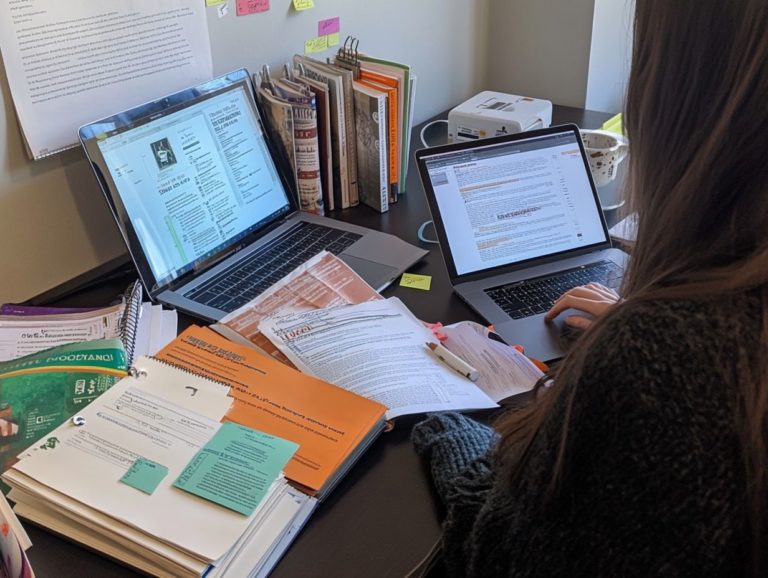how to stay motivated during test preparation?
Preparing for tests can often feel overwhelming. Keeping your motivation high is essential for success!
Motivation drives effective study habits. Identify common obstacles like procrastination and feelings of being overwhelmed.
Contents
Key Takeaways:

Motivation is crucial for success in test preparation. It helps maintain focus and determination. Overcome obstacles like procrastination by creating a study plan and rewarding yourself. Self-care is vital for staying sharp mentally and physically.
The Importance of Staying Motivated during Test Preparation
Staying motivated is vital for success in tests like the ACT. Motivation leads to small victories that contribute to your overall achievement!
You must balance study and life. Whether preparing for the ACT, SAT, or GMAT, this balance is key to your long-term success.
Why Motivation is Key to Success
Motivation is the cornerstone of success in test preparation. When motivated, you’ll discover how to stay organized during test prep and find study techniques that fit your learning style!
For instance, you might try the Pomodoro technique, breaking study sessions into focused intervals with short breaks. This can enhance retention.
Setting specific milestones can inspire you to track your progress and make necessary adjustments when challenges arise.
With a clear vision of your goals and regular reflection on your achievements, you create an environment where engagement thrives and obstacles are confronted with determination.
Identifying and Overcoming Common Obstacles

Identifying and overcoming distractions is crucial for high scores. Tackle challenges head-on to create an effective study environment!
Procrastination and Distractions
Procrastination can derail your study time. You may get sidetracked by notifications or noise around you.
These interruptions can hurt productivity and increase anxiety. Carve out a dedicated study space free from distractions!
Use noise-canceling headphones or apps that block social media to stay focused. Mindfulness practices like brief meditation can also help.
Feeling Overwhelmed
Feeling overwhelmed during test preparation is a common experience, but you can manage it effectively by learning how to write a study plan for test preparation, along with thoughtful self-care techniques.
This emotional state often leads to anxiety and helplessness, making it tough to focus or retain information. To counter this, break down larger study goals into smaller, more achievable tasks.
This approach creates a clear pathway and gives you a sense of accomplishment with each completed task. Prioritizing self-care during these stressful times is vital; neglecting your well-being can amplify feelings of overwhelm.
Simple practices like taking regular breaks, engaging in physical activity, and practicing mindfulness can significantly boost your motivation and resilience. Start incorporating these self-care practices today to feel more in control!
Easy Tips for Staying Motivated

Maintaining motivation is crucial for students like you who are striving for success in test preparation, especially for exams like the ACT. Understanding what mindset is best for test preparation can significantly enhance your study effectiveness.
Setting Realistic Goals
Setting realistic goals is a foundational strategy in any effective study plan. These goals act as motivational tools that propel you toward success as you prepare for high-stakes exams.
Break down larger objectives into smaller, manageable tasks to create a clear pathway that aligns with your study habits and timelines. Evaluate your unique learning style and pace to ensure each goal is attainable and tailored to your needs.
Engaging an accountability partner can enhance this process. Sharing your progress with someone encourages consistency and fuels motivation. This partnership lets you track achievements, celebrate milestones, and receive support during challenging times.
Creating a Study Plan
Creating a study plan that aligns with your learning style is essential for maintaining motivation and ensuring consistent progress in exam preparation.
Incorporate structured daily study schedules to allocate specific time blocks for various subjects. This helps prevent that overwhelming feeling.
Utilizing diverse study techniques like active recall (testing yourself on the material) and spaced repetition (reviewing information over increasing intervals) caters to different learners and enhances information retention.
Tracking your progress through weekly assessments or journaling reveals patterns and highlights areas needing attention, making it easier for you to adapt your plan over time.
Ultimately, this personalized approach fosters a sense of ownership and control over your learning journey, leading to improved understanding and higher test scores.
Utilizing Positive Reinforcement

Utilizing positive reinforcement is a great motivation strategy that lets you celebrate small victories, nurturing greater confidence as you prepare for exams.
When educators acknowledge small achievements like submitting homework on time or participating in class discussions they create a supportive environment where you feel valued and encouraged. This recognition can come in various forms, such as:
- Stickers
- Extra credit points
- Small treats
These incentives motivate you to engage actively in your learning and significantly boost your self-esteem. Recognizing small wins over time can greatly enhance your long-term motivation and improve your exam performance by associating hard work with positive outcomes.
Maintaining a Healthy Mind and Body
Maintaining a healthy mind and body is essential for students preparing for tests. Engaging in self-care practices can greatly reduce stress and enhance focus during study sessions.
Prioritizing your well-being sharpens your concentration and fosters a more effective and enjoyable learning experience. Embrace self-care as a vital component of your study routine!
The Role of Self-Care in Motivation
Self-care is crucial for boosting your motivation. A proper study/life balance minimizes anxiety and helps you focus on your future goals.
Engaging in self-care like mindfulness meditation, exercise, or leisure time lets your mental and emotional batteries recharge.
When you take breaks or do activities you enjoy, you nurture your well-being and create a more productive study environment.
This rejuvenation reduces burnout and clears your mind, making it easier to concentrate on academic tasks.
Acknowledging these self-care rituals sets the stage for better study habits and a positive outlook on responsibilities.
Ways to Reduce Stress and Stay Focused
Incorporating stress-reduction techniques can greatly enhance your focus and motivation. This leads to better performance in test preparation.
Add mindfulness exercises like meditation and deep breathing to your routine. This can help you feel more relaxed and think more clearly while studying.
These practices help you manage anxiety and promote a present mindset, boosting retention and comprehension.
Effective time management setting realistic goals and breaking study material into chunks helps you learn without feeling overwhelmed.
When you lower your stress, watch your motivation soar! You’ll approach exams with confidence and clarity!






